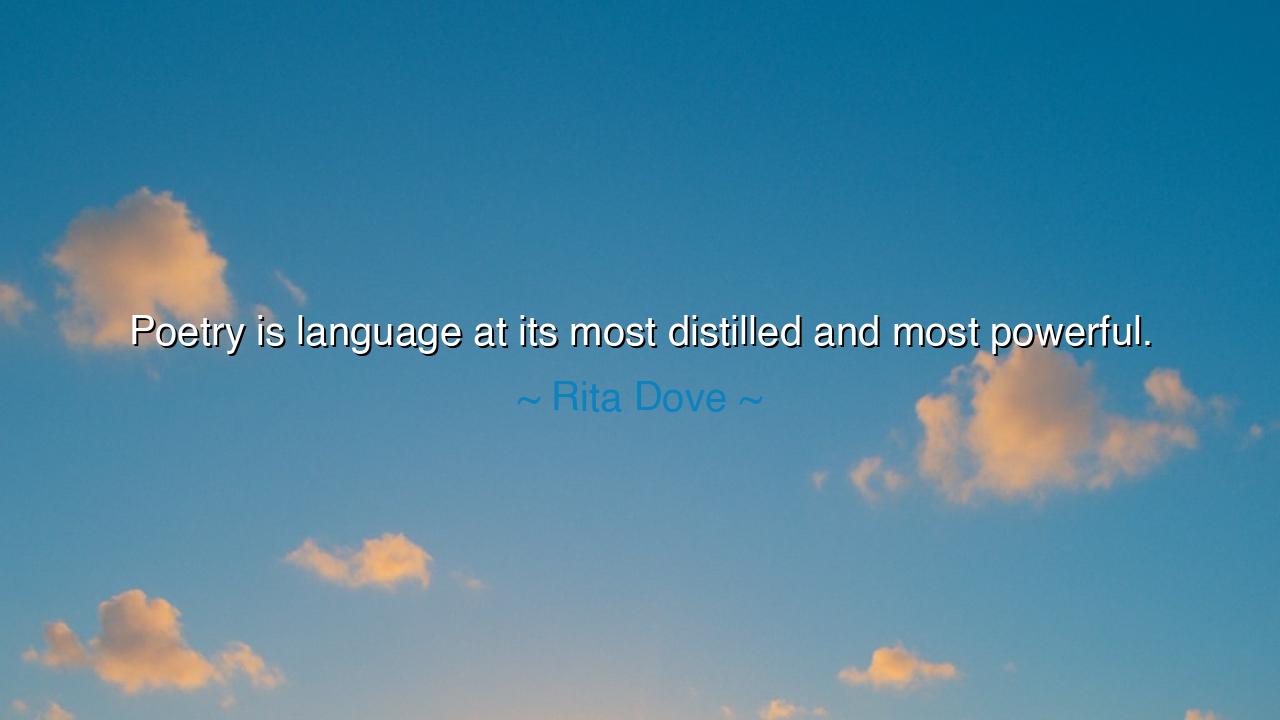
Poetry is language at its most distilled and most powerful.






Rita Dove, poet laureate and guardian of words, once spoke with crystalline clarity: “Poetry is language at its most distilled and most powerful.” In this declaration she reminds us that poetry is not excess, not ornament, but essence. Just as alchemists once sought to refine gold from stone, the poet refines language from the common dust of speech, reducing it to its purest, most radiant form. In poetry, no word is wasted, no sound is accidental, no image is without weight. It is distilled—boiled down to its quintessence—and in that distillation, it gains power to move hearts and shape souls.
The ancients revered this truth long before Dove named it. In the hymns of the Rigveda, in the psalms of Israel, in the epics of Homer, the people recognized that the smallest phrases could carry the deepest truths. When the Psalmist sang, “The Lord is my shepherd,” he used not a thousand words of argument but a single distilled image that has endured across millennia. This is what Dove means: poetry does not multiply words but condenses them, until each syllable strikes like lightning.
History gives us luminous examples. Think of Abraham Lincoln at Gettysburg. His speech lasted only a few minutes, barely more than two hundred words. Yet because it was distilled to its essence, it became immortal. He did not speak with the sprawling length of his contemporaries, but with the conciseness of a poet. “Government of the people, by the people, for the people”—these nine words hold the weight of a nation’s identity. They were distilled, and therefore they were powerful.
There is something heroic in this act of distillation. To compress truth into few words requires immense discipline, courage, and vision. It is easy to speak at length, piling word upon word until the listener drowns. It is far harder to carve away all that is unnecessary, to leave only what shines. The poet is like the sculptor who chips stone until the figure emerges; each cut is sacrifice, but what remains has the strength to endure the centuries. Poetry’s power lies not in abundance, but in precision.
Yet the power of distilled language is not only in beauty, but in its ability to pierce the heart. A speech may impress the mind, but a poem seizes the soul. One line can comfort the grieving, ignite the oppressed, or awaken the indifferent. Consider Maya Angelou’s line, “Still I rise.” Only three words, yet they thunder with centuries of suffering and defiance. Distilled to its core, this line carries a power greater than any library of rhetoric. It shows us that poetry’s strength lies not in length, but in concentration.
The lesson for us is clear: when we speak, when we write, when we live, let us strive for essence, not excess. Do not waste words, for words are seeds; plant only what is needed, and let them grow strong. Whether in poetry, in love, or in leadership, distilled words carry the greatest weight. Speak less, but mean more. Choose words that endure, not those that merely fill silence. In this way, our speech too may become powerful.
Practical wisdom flows. Practice distilling your thoughts—write them shorter, sharper, truer. Read poetry aloud, and let its rhythm teach you how to wield words with precision. When you face conflict, do not speak endlessly; find the distilled truth and speak it with courage. And when you seek to inspire, remember that one line of truth is stronger than a thousand lines of flattery.
Thus Rita Dove’s words become eternal teaching: “Poetry is language at its most distilled and most powerful.” Learn this, and your words may not only communicate, but transform. For in the crucible of poetry lies the essence of human expression—the fire reduced to a flame, yet strong enough to light the world.






KPKiet Pham
Rita Dove’s definition of poetry feels like a reminder of how much power words can hold. But when language is 'distilled,' does it also risk losing some of its richness or depth? Is there ever a danger in reducing emotions or experiences to the point where something important is left out? How do poets strike that balance between economy and emotional depth while keeping their words potent and meaningful?
DKtrinh duy khanh
This quote by Rita Dove really makes me think about how poetry condenses complex emotions and thoughts into a few carefully chosen words. But what makes poetry different from other forms of writing in its ability to capture such power? Is it the intention behind the words, or the way language is manipulated in poetry that gives it its distilled, impactful nature? How do different readers interpret this power in various forms of poetry?
MHVu Minh Huyen
The idea of poetry being the most 'distilled' and 'powerful' form of language is so intriguing. It makes me wonder, how do poets achieve this power? Is it in the choice of words, the rhythm, or the underlying emotions that drive the poem? Can we truly capture the essence of a complex idea or feeling in such a concise form, or is there always something left unsaid that readers must interpret?
KNKhach Ngo
Rita Dove's description of poetry as 'language at its most distilled and most powerful' really makes me appreciate the unique quality of poetry. It’s as if the essence of emotion or thought can be captured in a few carefully chosen words. But can every poem be this powerful? Is it always about brevity and precision, or are there poems that thrive on expansiveness and exploration rather than economy of language?